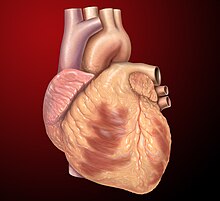| Cardiac amyloidosis | |
|---|---|
 | |
| Human heart |
Cardiac amyloidosis is a subcategory of amyloidosis where there is depositing of the protein amyloid in the cardiac muscle and surrounding tissues. Amyloid, a misfolded and insoluble protein, can become a deposit in the heart's atria, valves, or ventricles. These deposits can cause thickening of different sections of the heart, leading to decreased cardiac function.[1] The overall decrease in cardiac function leads to a plethora of symptoms.[2] This multisystem disease was often misdiagnosed, with a corrected analysis only during autopsy. Advancements of technologies have increased earlier accuracy of diagnosis. Cardiac amyloidosis has multiple sub-types including light chain, familial, and senile.[3] One of the most studied types is light chain cardiac amyloidosis.[2] Prognosis depends on the extent of the deposits in the body and the type of amyloidosis.[4] New treatment methods are actively being researched in regards to the treatment of heart failure and specific cardiac amyloidosis problems.[5][6]
- ^ Fikrle M, Paleček T, Kuchynka P, Němeček E, Bauerová L, Straub J, et al. (2013-02-01). "Cardiac amyloidosis: A comprehensive review". Cor et Vasa. 55 (1): e60–e75. doi:10.1016/j.crvasa.2012.11.018. ISSN 0010-8650.
- ^ a b Banypersad SM, Moon JC, Whelan C, Hawkins PN, Wechalekar AD (2012-04-24). "Updates in Cardiac Amyloidosis: A Review". Journal of the American Heart Association. 1 (2): e000364. doi:10.1161/JAHA.111.000364. ISSN 2047-9980. PMC 3487372. PMID 23130126.
- ^ Falk RH, Alexander KM, et al. (2016-09-20). "AL (Light-Chain) Cardiac Amyloidosis: A Review of Diagnosis and Therapy". Journal of the American College of Cardiology. 68 (12): 1323–1341. doi:10.1016/j.jacc.2016.06.053. ISSN 0735-1097. PMID 27634125.
- ^ Bhogal S, Ladia V, Sitwala P, Cook E, Bajaj K, Ramu V, et al. (2018-01-01). "Cardiac Amyloidosis: An Updated Review With Emphasis on Diagnosis and Future Directions". Current Problems in Cardiology. 43 (1): 10–34. doi:10.1016/j.cpcardiol.2017.04.003. ISSN 0146-2806. PMID 29173805.
- ^ Cite error: The named reference
:2was invoked but never defined (see the help page). - ^ Cite error: The named reference
:42was invoked but never defined (see the help page).